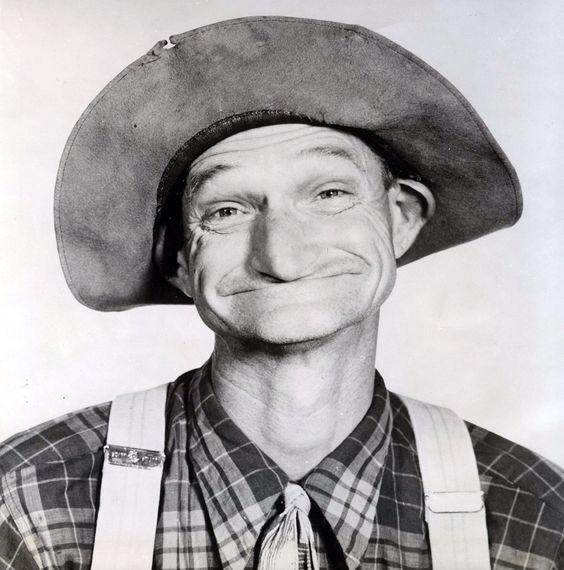Rural comedy coupled with considerable musical talent transported James Clell Summey from Possum Hollow, Tennessee, where he was born in during the World War I era, to the Grand Ole Opry, where he performed as Cousin Jody.
Summey’s parents were musical, so he grew up learning to play several instruments, including the guitar and steel guitar, which he called a “biscuit board.” He first appeared publically on a radio variety show he established in Knoxville, Tennessee, that aired daily and became an instant success.
Summey first played with a group in 1933 that called themselves the Tennessee Crackerjacks. A young Roy Acuff joined the band, eventually luring Summey from the mountains of East Tennessee to Nashville for an Opry performance in 1937. The dobro had been developed in the 1920s, and Summey was an accomplished player who was the first artist to feature the instrument at the Opry. Acuff used Summey’s dobro talent to back up most of his early recordings. Listen to Acuff’s original recordings of “The Great Speckled Bird” and “Wabash Cannonball.” That’s Summey on the dobro.
Creative differences with Acuff promoted his exit from the band. Summey worked with artists like with Pee Wee King and Lonzo and Oscar and even played steel guitar for Eddie Arnold before carving his own niche in the comedy genre with Oral Rhodes as half the Odie and Jody duo. As “Our Cousin Jody,” the multi-talented performer became a star in his own right and was an Opry regular for more than 30 years. Once asked why he had chosen the stage name Cousin Jody, he replied, “Don’t I look like your Cousin Jody?”
He made appearances on “Ed Sullivan’s Toast of the Town,” “The Kate Smith Show,” “The Dave Garroway Show” and “Steve Allen’s Tonight.” Newspapers covering his brand of entertainment often noted that he was a “pantomime artist” in addition to a singer and musician. He was also featured actor in several cowboy movies with Roy Rogers and Johnny Mack Brown.
During musical performances with his group, the Country Cousins, he would open the number by telling funny stories in an exaggerated hillbilly voice. His stage persona wore a tattered hat, had no teeth and dressed in flamboyant shirts and baggy, garish pants. In reality he was a distinguished 6’5” man who served in the U.S. Army Air Corps during World War II.
Cousin Jody and the Country Cousins traveled throughout Europe entertaining the troops during the early 1960s and became a popular act beyond the Opry, appearing at festivals and small concert venues and releasing recordings like “Lady Cop” and “Television Set.”
In 1966 Summey became involved in a lengthy federal lawsuit he filed against The National Informer Publishing Co. and its Chicago owners, Vincent and Josephine Sorren. The Informer, a tabloid paper, had run a professional publicity photo of Summey dressed as Cousin Jody with a caption that suggested he was a sexual deviant. Summey’s suit argued that the article was “false, libelous and malicious” and was published to willfully “injure, disgrace and defame” him. He asserted that his personality had been invaded along with his right to privacy and his natural copyright to his own features had been violated. He stated that the attack had permanently damaged his good name. In 1968 Summey was finally granted a default judgment for $200,000.
Summey made additional headlines in 1968 when he married his third wife, Marie Hill, after meeting her in a Nashville laundry mat a few months prior.
The comic died in 1975 at age 61 following an extended illness, leaving behind his wife, Marie, a son, Clell Vernon Summey, whose mother was Summey’s first wife, Dorothy, and a daughter, Jodena Summey, whose mother was his second wife, Sarah.
He also left behind a favorite sing-along song, “On Top of Old Smokey,” that families on long car trips and school children on buses were singing for decades after Summey’s recording sealed its popularity.
By Danny Nichols

